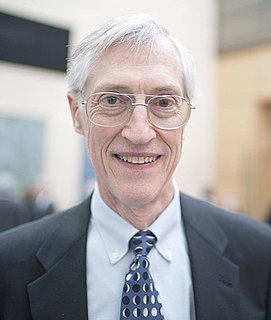A Quote by John Rhys-Davies
The universe starts off with the Big Bang theory, and the first thing that emerged from the Big Bang is essentially hydrogen and then helium. And that's what combusts in stars. Finally, stars implode, and they build heavier elements out of that. And those heavier elements are reconstituted in the heart of other stars, eventually.
Related Quotes
Modern thinking is that time did not start with the big bang, and that there was a multiverse even before the big bang. In the inflation theory, and in string theory, there were universes before our big bang, and that big bangs are happening all the time. Universes are formed when bubbles collide or fission into smaller bubles.
String theory has the potential to show that all of the wondrous happenings in the universe - from the frantic dance of subatomic quarks to the stately waltz of orbiting binary stars; from the primordial fireball of the big bang to the majestic swirl of heavenly galaxies - are reflections of one, grand physical principle, one master equation.
One can imagine that God created the universe at literally any time in the past. On the other hand, if the universe is expanding, there may be physical reasons why there had to be a beginning. One could imagine that God created the universe at the instant of the big bang, or even afterwards in just such a way as to make it look as though there had been a big bang, but it would be meaningless to suppose that it was created before the big bang. An expanding universe does not preclude a creator, but it does place limits on when he might have carried out his job!
People have stars, but they aren't the same. For travelers, the stars are guides. For other people, they're nothing but tiny lights. And for still others, for scholars, they're problems... But all those stars are silent stars. You, though, you'll have stars like nobody else... since I'll be laughing on one of them, for you it'll be as if all the stars are laughing. You'll have stars that can laugh!... and it'll be as if I had given you, instead of stars, a lot of tiny bells that know how to laugh.
Our entire universe emerged from a point smaller than a single atom. Space itself exploded in a cosmic fire, launching the expansion of the universe and giving birth to all the energy and all the matter we know today. I know that sounds crazy, but there’s strong observational evidence to support the Big Bang theory. And it includes the amount of helium in the cosmos and the glow of radio waves left over from the explosion.
In some sense, what you might have suspected from the first day of high-school chemistry is true: The periodic table is a colossal waste of time. Nine out of every 10 atoms in the universe are hydrogen, the first element and the major constituent of stars. The other 10 percent of all atoms are helium.
It's becoming clear that in a sense the cosmos provides the only laboratory where sufficiently extreme conditions are ever achieved to test new ideas on particle physics. The energies in the Big Bang were far higher than we can ever achieve on Earth. So by looking at evidence for the Big Bang, and by studying things like neutron stars, we are in effect learning something about fundamental physics.
The universe and the Laws of Physics seem to have been specifically designed for us. If any one of about 40 physical qualities had more than slightly different values, life as we know it could not exist: Either atoms would not be stable, or they wouldn't combine into molecules, or the stars wouldn't form heavier elements, or the universe would collapse before life could develop, and so on...
The Big Bang has gone away, but as far as Super String, that is suspicious for me. It all starts out with the notion of Big Bang, which if it were true, starts out with incredibly high temperatures. So they think [we] need to get these high temperatures for this broken symmetry; all this broken symmetry reunited, and we do not have enough energy in the whole galaxy to get to those temperatures, to prove their point. To me, that is the single flaw in Super String theory.

































